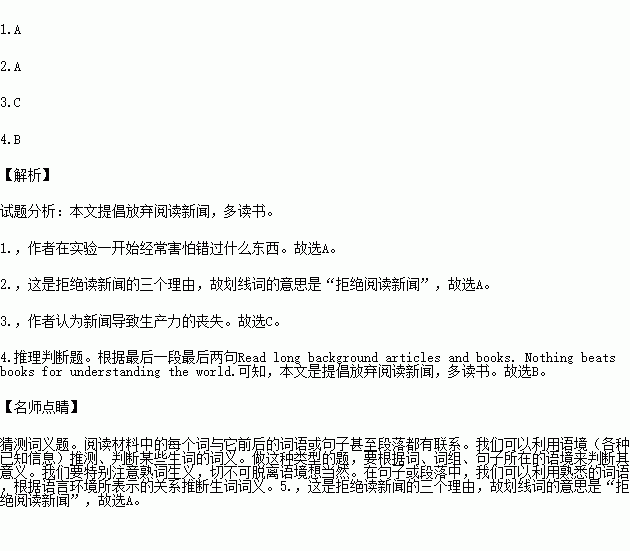题目内容
Earthquake in Japan.Donald Trump is accused of planting story about actress’s height after she rejected him. Mexico arrests ex-police chief in case of 43 missing students. Do you really need to know all these things?
Three years ago, I began an experiment. I stopped reading all newspapers and magazines. Televisions and radios were rejected. I deleted the news apps from my iPhone. I didn’t touch a single free newspaper and deliberately looked the other way when someone tried to offer me any such reading material. The first weeks were hard. Very hard! I was constantly afraid of missing something. But after a while, I had a new understanding. The result after three years: clearer thoughts, more valuable ideas, better decisions, and much more time. And the best thing? I haven’t missed anything important.
A dozen reasons exist to give news a wide berth. Here are the top three: First, our brain reacts differently to different types of information. Shocking, people-based, fast-changing details all appeal to us. News producers capitalize on this. The result: Everything complex, abstract, and profound(深刻的) must be systematically singled out, even though such stories are much more relevant to our lives and to our understanding of the world. As a result, we walk around with a misrepresented mental map of the risks and threats we actually face.
Second, news is irrelevant. In the past year, you have probably consumed about ten thousand pieces of news. Be very honest: Name one of them, just one that helped you make a better decision—for your life, your career, or your business—compared with not having this piece of news. No one I have asked has been able to name more than two useful news stories—out of ten thousand. News organizations claim that their information gives you a competitive advantage. Too many fall for this. If news really helped people advance, journalists would be at the top of the income pyramid.
Third, news is a waste of time. An average human being spends half a day each week reading about current affairs. This is a huge loss of productivity. Take the 2008 terror attack in Mumbai. Let’s say a billion people viewed the minute-by-minute updates and listened to the chatter of a few “experts” and “commentators.” Thus our conservative calculation: One billion people multiplied by an hour’s distraction equals one billion hours of work stoppage. News wasted around two thousand lives—ten times more than the attack.
I would predict that turning your back on news will benefit you as much as removing any of the other ninety-eight errors we have covered in the pages of this book. Read long background articles and books. Nothing beats books for understanding the world.
1.How did the author feel at the beginning of his experiment?
A. He was in constant fear.
B. He enjoyed it very much.
C. He had a better vision about life.
D. He missed his friends and relatives.
2.What does the underlined phrase in Paragraph 3 probably mean?
A. Refuse to read news.
B. Select newscarefully.
C. Question news.
D. Help circulate news.
3.In the author’s opinion, news ________.
A. represents a competitive advantage
B. offers a mental map of the world
C. leads to a loss of productivity
D. brings journalists’ income up
4.What’s the main purpose of writing the passage?
A. To offer tips on choosing news.
B. To advocate giving up reading news.
C. To share experiences on avoiding news.
D. To criticize media’s misleading choice of news.


 ),并在其下面写出该加的词。
),并在其下面写出该加的词。